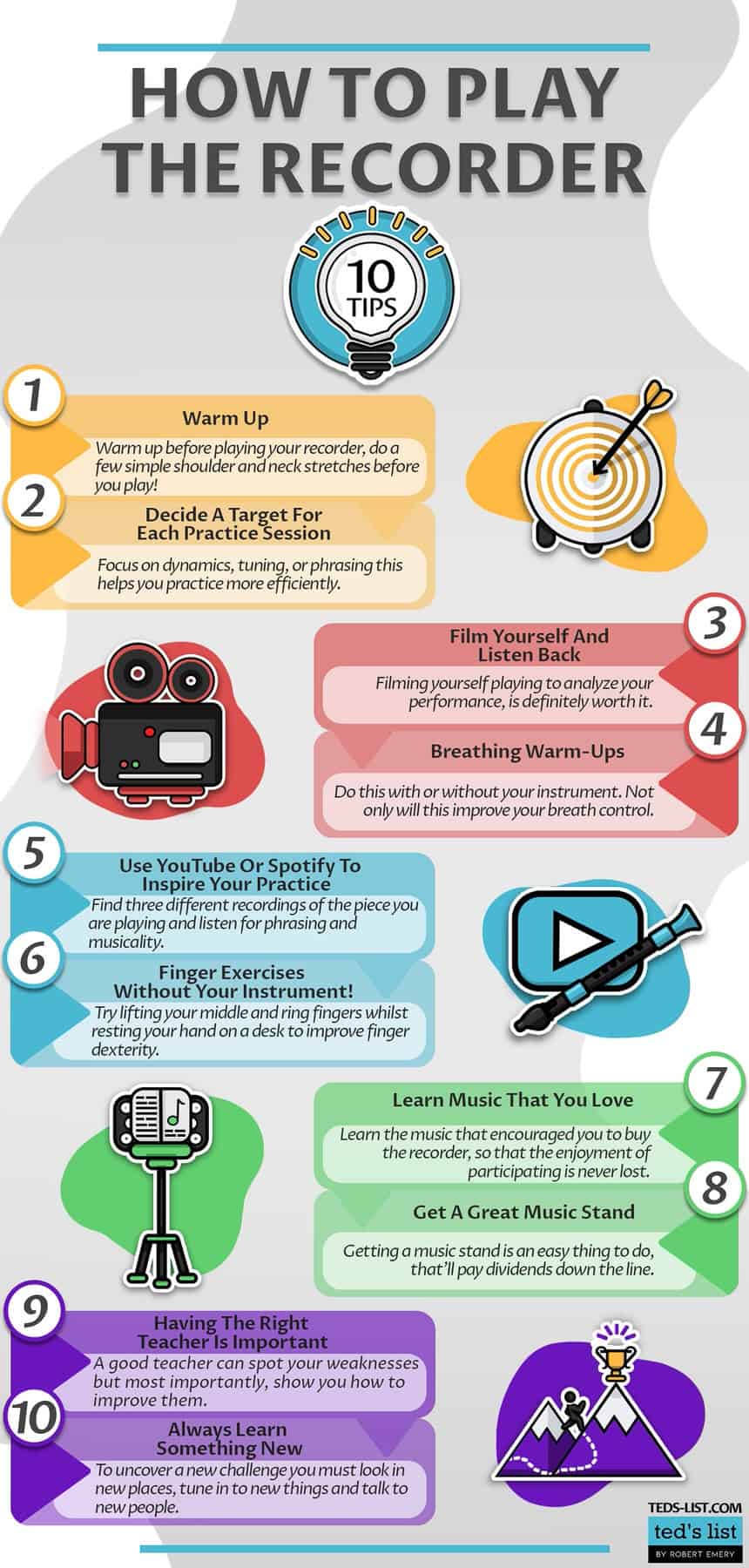If you’re keen to learn the recorder, it can seem tricky, but it’s also truly amazing to play. Here are **10 tips** that will make it easier to pick up the recorder quickly.”
But what exactly is the easiest method to begin?
How do you continue to keep having fun whilst sustaining progress?
Well, it’s all about your practicing strategies. Recorder music isn’t the simplest music in the world to perform, so it’s critical to get a powerful technique of practice to start you off in the proper direction. Practice makes perfect!
So the following is our list of top 10 tips to playing the recorder to help you start learning….
Warm up
Warm up your body before you start playing your new recorder. Do a few simple shoulder and neck stretches before you play and your body will thank you for it!
Decide a target for each practice session
There are many different types of recorders. You can get wooden recorders and plastic recorders. Most students start on a soprano recorder some on a tenor recorder. Either way, you’ll still need to practice well. Perhaps you plan to focus on dynamics, tuning, or phrasing. This helps you practice more efficiently so you don’t get stuck in a rut.
Film yourself and listen back
It doesn’t matter if you have a lovely wooden recorder like my favorite model shown below, the Hohner 2 Piece Wooden Soprano Recorder, or a cheaper plastic recorders like the Ferris FR400S Descant/Soprano. Filming yourself playing and watching back can be brutal, but is definitely worth it.
Start or End your practice with some breathing warm-ups
Do this with or without your instrument. Not only will this improve your breath control but it is also very steady stream relaxing – think of it the same way as meditation or mindfulness! It’ll help everything from your good sound through to your breathing technique.
Use YouTube or Spotify to inspire your practice
Find three different recordings of the piece you are playing and listen for phrasing and musicality. Borrow the great ideas you like and ignore the parts which are not to your taste.
You can do finger exercises without your instrument!
Try lifting your middle and ring fingers whilst resting your hand on a desk to improve finger dexterity. Useful if you’re bored in a meeting or during a math lesson! Remember you have two hands – your right hand reserves just as much attention as your left hand…
Learn Music That You Love
This is a straightforward tip, but also one of the more useful. To put it simply, playing Recorder will be ten times more fun if you’re learning the music that encouraged you to buy the Recorder in the first place.
Not only does this improve each musician’s repertoire but it also helps to keep them encouraged and makes such that the enjoyment of participating in music is never lost.
If all that you do is play countless scales and arpeggios then it can feel a little bit soulless and you’ll possibly feel that you’re not getting anywhere.
Having said that, if you can grab the Recorder right after a hard day at school or work and chill out for the evening by playing through your favorite music, then you’ll associate playing the Recorder with fun and pleasure.
And this sensation will always help keep you coming back to the Recorder for more.
Get A Great Music Stand
You need a music stand at home. No negotiation needed!
Getting a music stand is an easy thing to do, that’ll pay dividends down the line. Out of every little thing outlined in this article, this is undoubtedly the simplest tip to achieve with a very little effort!
Getting a collapsible stand is ok – especially in terms of having one for when you have to bring your own personal stand to a gig, playing position, recording session, or music lesson. In this instance, we suggest this collapsible stand.
It may be a little more costly initially to buy a foldable AND a non-flip-style – but you’ll save money in the end. Believe me when I say, the continual up and down of the collapsible stands really does make them break easily – so when you can minimize the amount you do it (by using your non-collapsible at home), then you’ll become the very proud owner of two music stands that’ll endure for years!
We advise this model of music stand. It is reliable, has great reviews, and I have one myself and think it’s great!
Having The Right Teacher Is Important
The tip is the most vital: An excellent music teacher is the most precious thing in the world. They will identify your weaknesses however, most importantly, reveal to you tips on how to improve them. They are going to direct you to the best method book for your own style of learning. So if you can pay for it, get private lessons or music class.
But how can you tell when you’ve got a good teacher? There are so many available!
Look for basic factors:
- Do you really understand them when they are teaching you tricky techniques?
- Are you making decent improvements with them?
- Do they invigorate you?
For those who answered yes to the majority or all of these questions, then you’ve discovered a fantastic tutor who works for you.
However, are you still in search of that elusive person? Where do you go to find someone who could help you play recorder?
My first ‘port of call’ would be to find personal referrals from your local area. Perform some research on Facebook and LinkedIn to see who your local teachers are, and what type of support they have from their pupils.
You could apply to join the Ted’s List VIP Facebook Group, where we have many, many , recorder players ,recorder teachers (and fellow pupils!) who might be able to help…
Great teachers will frequently have a waiting list. All these things are a good sign that the teacher is worthwhile and in demand.
Should this be the situation, get on that waiting list, and ask for a trial lesson.
Whatever happens, don’t freak out, or stress. Nothing is forever, so in case you find a teacher and it doesn’t work out, simply start to look for another teacher! You can never be 100% sure in regards to a connection between two individuals, so just go for it!
Always Learn Something Totally New
Learning a musical instrument like the Recorder is a lot like going exploring. It only truly seems like it’s been worth it when you find a new challenge.
However, to find a new challenge you will need to look in new places, focus on a new challenge and other factors, and speak to new people.
The best way to make this happen is simply by engaging with the Recorder community via a regular magazine, online forum or YouTube channel. Our Ted’s List Facebook VIP Group has a lot of musicians that help and support each other; so come and join that.
A magazine, for instance, will have new columns and tips for you to read every month and many of the writers give out small weekly lessons complete with brand new exercises to try and help you improve.
Online discussion boards will have discussions between different recorder players and other instruments on a variety of subjects. Watch out though. These can get pretty heated sometimes!
And a decent YouTube channel will publish new video tutorials each week for you to go through. If you haven’t done it yet, take a look at Ted’s List YouTube channel, where we now have 100’s of videos on all musical instruments.
Understanding a new challenge will broaden your horizons while keeping you enthusiastic to further improve.
How to play the recorder - top 10 tips
Summary
To play the recorder, you can start by learning proper hand placement and fingering techniques. Hold the instrument with your left hand on top, covering the top three holes, and your right hand covering the bottom three. Practice playing basic notes and gradually progress to more complex melodies. Consistent practice and patience will improve your skills on the recorder.
And if you don’t have a recorder yet, we recommend this wooden recorder. It can produce a lovely sound and doesn’t cost the earth!
I hope you’ve enjoyed our top 10 tips on how to play the recorder. Good luck and enjoy playing, and if you’ve enjoyed this article, make sure you leave a comment below…
Do you want to share this infographic on your site? Use this code...
FAQ's
There are four main types of recorders: soprano, alto, tenor, and bass. Each type has a different range and is used for different genres of music.
To get better at playing the recorder, you can practice regularly, work on your breathing and finger technique, and listen to recordings of professional players. It’s also helpful to take lessons from a qualified instructor who can provide feedback and guidance on your playing.














All good tips. Being an elementary teacher myself, I also recommend only learning to read the notes you want to play; otherwise it turns into Algebra class. 🙂
Here’s a site (free) I put together for my students. The idea is to work your way through the series of belts. Free sheet music, video and audio files.
http://portablerecorder.ca/
My son recently brought home a recorder and with this article, I should be able to help a bit more despite my lacking skills!
Well I’m glad we could help. Keep us posted!